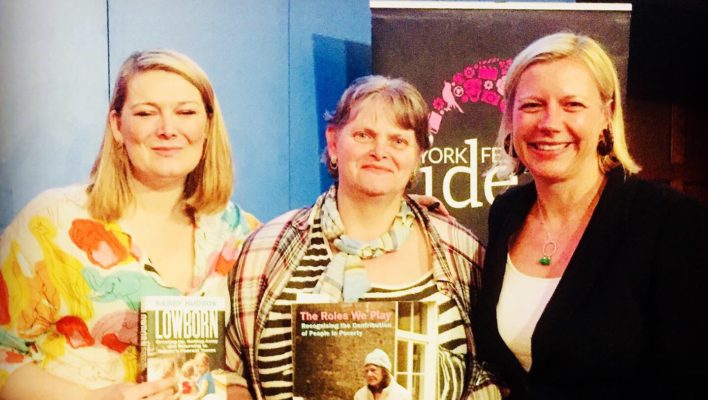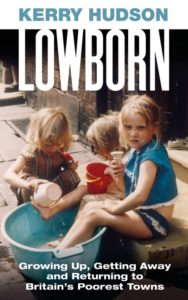Lowborn – by Kerry Hudson

Above: Kerry Hudson (left) with Amanda Button of ATD Fourth World and Abigail Scott Paul at the 2019 York Festival of Ideas.
Below, the award-winning Kerry Hudson shares the introduction to her memoir, “Lowborn: Growing Up, Getting Away and Returning to Britain’s Poorest Towns”. To learn more about Kerry, please see Project Twist-It.
Shall we start with a happy ending? I made it. I rose. I escaped poverty. I escaped bad food because that’s all you can afford. I escaped threadbare clothes and too-tight shoes. I escaped drinking or drugging myself into oblivion because . . . because. I probably escaped the early mortality rates and preventable diseases – we’ll see. I escaped obesity. I escaped the higher rate of domestic abuse. I escaped sink estates, burnt-out houses and ice-cream vans selling drugs at the school gates. I escaped Jeremy Kyle in a shiny suit telling me my sort was scum. I escaped casual, grim violence fuelled by frustration and Special Brew. I escaped benefits queues and means assessments and shitty zero-hour contracts. I escaped hopelessness. I lived more of that life, my first twenty years, than I’ve lived of this infinitely cushier one since. And the names still ring in my head every day: chav, scav, lowlife, NED, underclass, lowborn.
I lived more of that life, my first twenty years, than I’ve lived of this infinitely cushier one since. And the names still ring in my head every day: chav, scav, lowlife, NED, underclass, lowborn.
Yes, I might have been lowborn but, somehow, I ascended. I reached up high enough to write these words and believe someone might read them. Now I eat well and always have somewhere decent to stay. My clothes are cheap, but I can afford to replace them. I enjoy the luxury of exercise. I heat my flat in the winter. I have access to art, music, film, books and they don’t feel like a foolishness. When I’ve been unwell, in mind or body, I’ve sought help, it’s been given, and I’ve got better. I’ve travelled the world several times over and made a living doing what I love which also happens to be the preserve of People Not Like Me.
But now let’s go back to the beginning:
1 single mother
2 stays in foster care
9 primary schools
1 sexual abuse child protection inquiry
5 high schools
2 sexual assaults
1 rape
2 abortions
My 18th birthday
The Adverse Childhood Experiences questionnaire asks ten questions to measure childhood trauma and each affirmative answer gives you a point. Research has shown that an individual with an ACE score of 4 or higher is ‘260% more likely to have chronic obstructive pulmonary disease than someone with a score of 0, 240% more likely to contract hepatitis, 460% more likely to experience depression, and 1,220% more likely to attempt suicide’. I scored 8.
It might be easier to believe that I was somehow unlucky. That I was a terrible exception. But the truth is the people I grew up with experienced much the same. A little less sometimes. Often a lot more. The difference for me? I saw something on the horizon and I ran. I ran, and I never looked over my shoulder.
I am proudly working class and, in this socially mobile hinterland I currently occupy, I miss the sense of community and belonging which that tribe might provide me.
But I was never proudly poor. True poverty is all-encompassing, grinding, brutal and often dehumanising. I think it goes without saying that the gnawing shame and fear of poverty is not something I have ever missed, particularly since I frequently still experience its aftershocks.
While my life is unrecognisable today, I find myself unable to reconcile my ‘now’ with my past. I can best describe this vertiginous feeling as belonging nowhere and to no one, neither ‘back there’ nor truly ‘here’. I have come to believe that being born poor is not simply a matter of economics or situation, it is a psychology and identity all its own that, in me, has endured well beyond my ‘escape’.
This book is the outcome of the questions that still disturb my peace. What happened to those towns I lived in? Surely things got better? There are other questions too, less easy to confront out loud, except perhaps when I wake up at night screaming obscenities at phantom shapes, inky terror running through me. What happened to me during those years? Have I really escaped? Has my fragmented memory been protecting me all these years or has it inflated, year by year, this terror? How much of my past is still part of who I am today?
Lowborn is available from Rakuten kobo.

